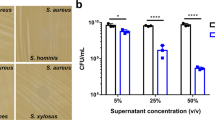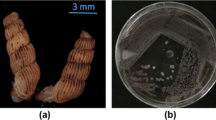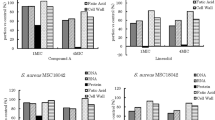Abstract
VANCOMYCIN, an antibiotic obtained from Streptomyces orientalis, is effective against a number of growing bacteria, particularly those which are Gram-positive. Mutation to resistance towards this compound is of a very low order, and the antibiotic has been shown to be clinically effective against strains of Staphylococcus aureus which are resistant to the more common antibiotics.
This is a preview of subscription content, access via your institution
Access options
Subscribe to this journal
Receive 51 print issues and online access
$199.00 per year
only $3.90 per issue
Buy this article
- Purchase on Springer Link
- Instant access to full article PDF
Prices may be subject to local taxes which are calculated during checkout
Similar content being viewed by others
References
Gale, E. F., and Folkes, J. P., Biochem. J., 53, 483 (1953).
Gale, E. F., “Harvey Lectures”, 51, 25 (1957).
Author information
Authors and Affiliations
Rights and permissions
About this article
Cite this article
JORDAN, D., INNISS, W. Selective Inhibition of Ribonucleic Acid Synthesis in Staphylococcus aureus by Vancomycin. Nature 184, 1894–1895 (1959). https://doi.org/10.1038/1841894b0
Issue Date:
DOI: https://doi.org/10.1038/1841894b0
This article is cited by
-
The effect of different combinations of antibiotic cocktails on mice and selection of animal models for further microbiota research
Applied Microbiology and Biotechnology (2021)
-
A systematic study of antibiotic antagonism
Antonie van Leeuwenhoek (1962)
-
Versuche zur Gliederung des Entwicklungsverlaufs derChlorella-Zelle
Planta (1960)
Comments
By submitting a comment you agree to abide by our Terms and Community Guidelines. If you find something abusive or that does not comply with our terms or guidelines please flag it as inappropriate.



